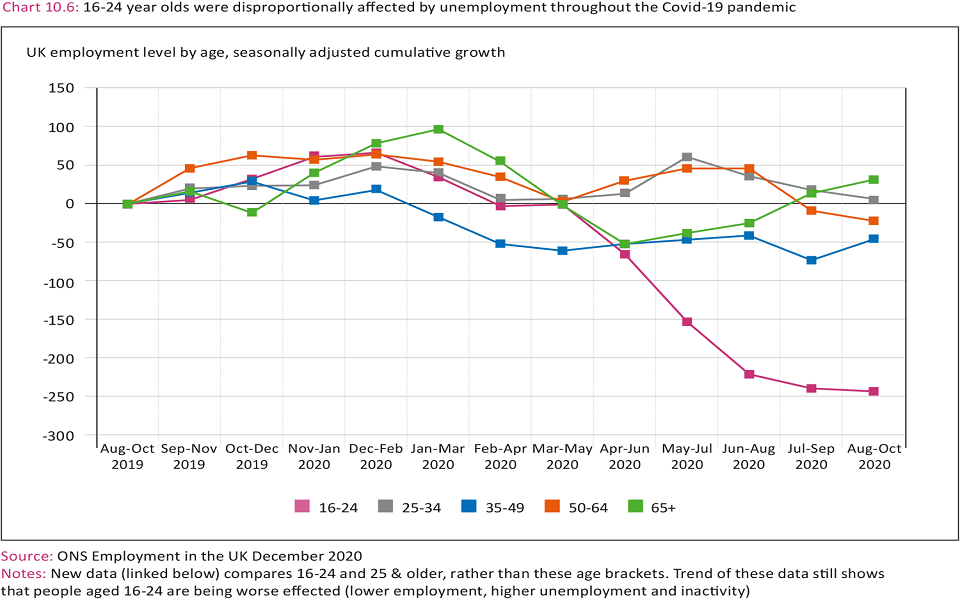Jose Vinaixa Kinnear was a Policy and Communications Intern with AYPH in the autumn of 2021, helping with the final stages of publication and dissemination of the next edition of ‘Key Data on Young People’. In this blog he shares the findings that struck him as particularly salient, reflecting on the impact of the pandemic on young people transitioning from university to work
Although young people have been better prepared to deal with the physical health risks of COVID-19, they will be severely impacted by the economic crisis that has emerged as a result. The following graph from the new Key Data on Young People 2021 resource illustrates how youth employment has decreased dramatically during the pandemic:

Young people aged 16-24 are the only group that saw its employment rate decline sharply during the first six months of the pandemic. But why has this been the case? More than one-third of non-graduates and over one-fifth of graduates work in a sector that has had to shut down because of social distancing measures (Henehan, 2020). This constitutes a large proportion of young people who have missed out on first jobs and the opportunity to build a professional network and a support system. What will be the long-term impact for education leavers who have skipped this key formative stage as they entered adulthood? Key Data highlights the importance of keeping track of what happens to this group of young people over the coming months and years.
The situation for young people in full-time study is also worrying. The turmoil in the labour market will have likely pushed many to stay in higher education. In addition to existing concerns about high tuition fees, remote teaching will have taken away many of the benefits of in-person study: practical learning, networking with lecturers, building close relationships with fellow students, etc. Once they complete their course, young people face competition from a larger pool of graduates, a frustrating situation that is very well reflected in this article by Amelia Hill (2021) published just at the point that we are launching the new edition of Key Data on Young People: “I have a degree and am ready to do the job, but I am being passed over by final-year students because I’ve been stuck and becoming de-skilled through no fault of my own”.
Despite the unprecedented challenges of this crisis, young people have been able to seize some of the opportunities that have brought more positive outcomes. As digital natives, they have adapted to remote processes (work, learning or other services) with more agility than their older counterparts. Many have been able to access opportunities which would have otherwise not been accessible due to location (Orlando, 2021), leading to career changes in favour of more flexible remote jobs that would not have otherwise been considered.
But previous economic crises have shown us that young workers are likely to be hit first and can easily fall into long-term unemployment (Kassid, 2021). We must not make the quick judgement that our youth have been spared from the worst of this public health crisis and instead think of better ways of supporting them for the long-term, over coming months and years. Youth-friendly health services, adequate career mentoring and opportunities to learn new skills will be critical to prevent young people from being left behind.
References:
Henehan A, Class of 2020: Education leavers in the current crisis, Resolution Foundation, May 2020 p.4
Hill A (2021) ‘Covid has formed the person I am’: young people on how the pandemic changed them‘ Guardian newspaper, 22 November 2021 https://www.theguardian.com/society/2021/nov/22/covid-has-formed-the-person-i-am-young-people-on-how-the-pandemic-changed-them
Kassid, S (2021) What about us? Youth (un)employment in times of COVID-19. World Future Council https://www.worldfuturecouncil.org/covid19-what-about-us/ Accessed 24 November 2021
Orlando C, (2021) Not just any job, good jobs: Youth voices from across the UK. London: Health Foundation https://www.employment-studies.co.uk/system/files/resources/files/Not%20just%20any%20job%2C%20good%20jobs%21.pdf

